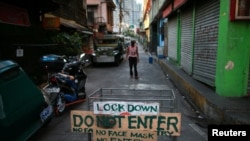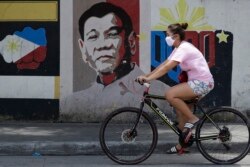Philippine journalists have pushed back against a government-issued press pass that would exempt them from the coronavirus lockdown in Luzon, saying the accreditation is not needed and could be used to restrict reporters or censor critical outlets.
Under strict quarantine measures that President Rodrigo Duterte announced last week, more than a million people in the Philippines have been told to stay home for one month. The country has also shuttered all non-essential business, retail and travel.
As of Tuesday, the Philippines has 396 confirmed coronavirus cases and 33 deaths, according to the World Health Organization.
Media are exempt from the Luzon lockdown provided they apply for a pass by March 26 from the Presidential Communications Operations Office (PCOO), said Manila's Inter-Agency Task Force on Emerging Infectious Diseases (IATF).
Journalists, however, said that the accreditation contravenes press freedom rights in the constitution, will be a barrier to covering the outbreak, and that a member of the agency in charge of issuing the accreditation has said it will prioritize mainstream media only.
The IATF has already limited passes to half of a news outlet's permanent staff, which contradicts earlier assurances that accreditation would be granted to any media workers who apply, the journalists said. They added that officials could use the accreditation to penalize or silence independent or critical news sites.
"They've set a literal limit to the people they will accredit," Jonathan de Santos, online editor of the news website PhilStar, told VOA. "I feel, as a Philstar.com journalist and as a member of the National Union of Journalists of the Philippines, that accreditation is an unnecessary requirement and a barrier to accurate coverage of the quarantine."
Miriam Grace Go, news editor at Rappler, told VOA that the International Press Center (IPC), the PCOO agency responsible for issuing the passes, asked her outlet to halve its list of journalists applying for accreditation.
She added that officials have also stopped journalists in areas on lockdown outside metro Manila to ask for proof that they are out working.
"In this environment — where cops at checkpoints differ in their interpretation of the powers given them, and where village officials are too pleased with the newfound authority they have to pick up people during curfew hours — you can imagine how they could only be countered by an accreditation card from the palace," she said.
The independent news website Bulatlat reported that a member of the IPC told them the agency was "prioritizing mainstream media."
Bulatlat said the accreditation could deny citizens alternative and independent news sources. In a statement published on its site Sunday, it said, "Denying us access to areas under quarantine, which is the entire Luzon, is outright censorship reminiscent of martial law."
Duterte said that anyone ignoring the quarantine restrictions would face harsh repercussions including arrest and jail, Reuters reported. He denied, in televised remarks, that the measures were akin to "martial law."
The spokesperson for the presidential office did not immediately respond to a request for comment sent via social media.
The Manila-based non-profit Center for Media Freedom & Responsibility (CMFR) said that the accreditation runs counter to Article 4 of the Philippine Constitution, which bars laws that could impede press freedom, and Section 7 that enshrines the right to "information on matters of public concern."
"What concerns us most is the possible misuse or abuse of accreditation to try and control the free flow of information, a concern rooted in this administration's record of open hostility toward critical media," CMFR said in a joint statement last week.
The IPC did not immediately respond to an email requesting comment.
The Philippine Embassy in Washington referred VOA to a March 17 briefing in which PCOO Secretary Jose Ruperto Martin Andanar said the passes were available to all journalists who met requirements, including a letter from their employer and a photo.
The embassy also referred VOA to a March 21 report by the government newswire the Philippine News Agency that said "reporters, broadcasters, cameramen, photographers, and crew drivers covering the COVID-19 pandemic" were exempt from quarantine and that the IPC had received almost 4,000 applications.
A member of the IPC told Bulatlat this week that the center has received 10,000 applications and "allowing all these media workers to go out during the quarantine period 'might cause the spread of the virus.' "
Go said that Rappler journalists were working from home and following guidance when reporting out in the field, including avoiding "hospitals or affected communities."
De Santos of PhilStar said his outlet's journalists were used to working online but, "There will be a problem, though, in getting stories on the ground, which is what is needed more at this point."
The National Union of Journalists of the Philippines said in a statement that media outlets have issued safety guidance on covering coronavirus, and called on authorities to reconsider the press pass, adding, "The media are better as partners during emergencies."






